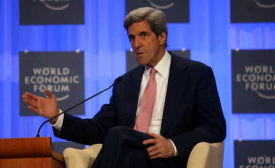aid diplomacy

At some point, the post-revolutionary Arab states will emerge from the self-destructive madness that has them so tightly in its grip. While Egypt, Syria, Libya, and Tunisia deal with varying degrees of instability, the future should be kept in sight.
With her labor pains intensifying, Epiphanie Nyirankurikiyimana knew the time had come to leave for the health facility.
Rather than give birth at home without skilled care, the 25-year-old mother, pregnant with her second child, telephoned Immaculée Bampoyineza, the village community health worker who had educated her on the importance of prenatal care and developing a birth plan. Immaculée agreed to accompany Epiphanie to the health facility. Instead of waiting for local transport—four men carrying a sling—the women began the three-mile walk to the health center.
The European Union has thrown delivery of billions of aid dollars into question as it meets "urgently" to coordinate a response to Egypt in the aftermath of a crackdown there that has killed almost 900 people in five days. Violence has skyrocketed since the military-backed interim government cleared two camps of supporters of ousted leader Mohammed Morsi in Cairo on Aug. 14.
Opinions among lawmakers remained split on Sunday over whether the US should cut off or suspend aid to Egypt. The US spends roughly $1.5 billion a year on assistance to Egypt with much of it going to financing the purchase of US military equipment. Calls to cut off or suspend this aid has been growing since the Egyptian military's crackdown against supporters of ousted president Mohamed Morsi. The violence has so far killed more than 750 people.
There has been a lot of talk lately about the relationship between development and trade, just as the United States is stepping up new trade initiatives across the Atlantic and the Pacific. The announcement of the Trade Africa initiative during President Barack Obama’s recent trip to Africa and calls to renew the African Growth and Opportunity Act next year have also put the benefits of trade with sub-Saharan Africa front and center, which holds 7 out of the fastest 10 growing economies.
Those who speculate that Iran will somehow absorb western Afghanistan into its sphere of influence when US and NATO forces drawdown in 2014 have not been through the doors of the threadbare “Public Library and Cultural Center” in Herat. Iran built the domed structure and stocked its library and classrooms seven years ago, a $190,000 project that it presented as a gift to the Afghan government. Today the center fulfils a critical need for its 700 mostly poor Afghan student members: English, math, art, Quran, and computer classes, and a study hall to prepare for university entrance exams.
Food shipped from America has saved the lives of millions of people since the Food for Peace programme was set up in 1954, but the strict rules demanding almost all of the food has to be sourced in the US and sent on American ships are coming under increasing attack. The Director of USAID, Rajiv Shah, says four million more people could be fed every year if he had more flexibility about where he bought food.
Another day, another parliamentary committee investigating the future of aid, this time the House of Lords select committee on soft power and the UK's influence. Soft power is the concept by Joseph Nye to describe ways in which countries nudge and cajole rather than pay or use force to further their interests. Or, as the committee's chairman put it, it is a way to "promote Britain's reputation, protect its interests and ensure security in a world where the military methods of the last century or two don't always work".







